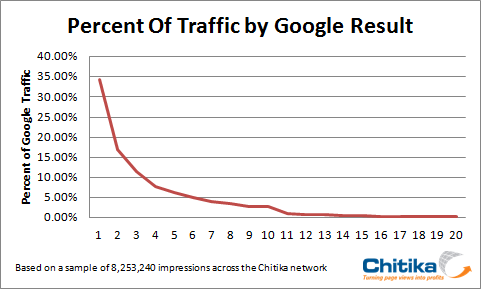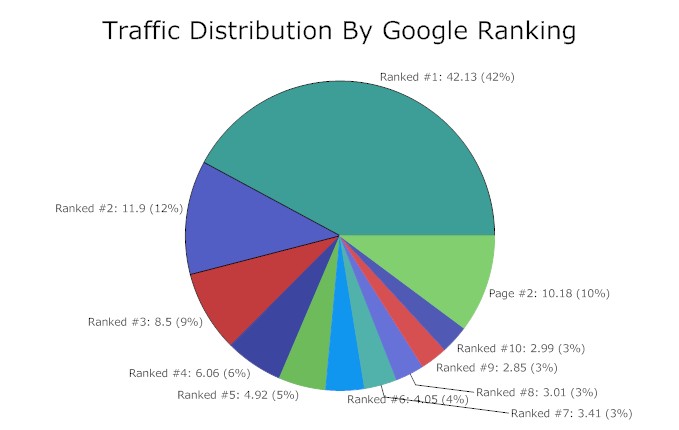Why Rank Checking is Still Useful
![]()
There's not a complex mathematical formula that is needed for one to understand the basic math associated with SEO. It boils down to something like:
Traffic + Conversions = $
That's a pretty easy way of looking at it, and it sort of ignores some of the variables that might go into it like:
- targeted traffic
- no so targeted traffic
- conversion rate
- volume
However, the basis of profiting via SEO mainly involves getting traffic to your website and converting (or monetizing) that traffic by whatever conversion (or monetization) methods you happen to be using on your website.
There are many means you can factor into the end game of an SEO campaign but at its most basic form it is about getting traffic and monetizing that traffic.
A Small-Minded Approach
The school of thought which postulates that ranking reports or ranking data is either essentially dead, useless, or pointless generally is a small-minded approach with respect to the various ways you can use ranking data and over-dramatizes the effect of changing search results from searcher to searcher. Small-minded simply because you can use ranking reports for more than just blindly monitoring keywords.
If the argument is that you should focus more on conversions than ranking in terms of straight revenue then I can buy that, to a degree, but the problem remains that you can't convert if you don't have traffic and you can't have traffic from search engines unless you rank highly for your keywords.

If the argument is that you shouldn't care because of personalized search, or local search, or different data center results then I would say that you are overstating the adoption and the effect. Sure, there could be a map or products or images in your search results (or tweets or news results) but I believe the idea that search results are so radically different from person to person, so different as to render ranking reports irrelevant, is quite overstated and inaccurate (from reports I've been running over time). All search results start from some starting point!
Knowing where you generally rank matters, watching the trend of your rankings in conjunction with your SEO tactics matters, and watching the evolution (up and down) of competing websites matters. To simply watch analytics data leaves so many opportunities on the table if we stipulate that ranking reports are a waste of time or mostly unimportant. When major algorithm updates or penalties happen, one of the quickest ways to help analyze what happened is to track your rankings before and after for a variety of keywords. That will help you determine things like:
- is the issue sitewide?
- is the issue related to a singular keyword?
- is the issue related to a group of closely related keywords?
- is the issue primarily impacting your most competitive keywords?
- is the issue related to a particular market?
Pattern matching is key to learning how algorithms work. Sure some of this type of data may be available in your web analytics, but rather than having to hunt and probe for it, rank checking allows you to quickly get a baseline idea of where the problem may be.
Trends & Measurable Effects
Suppose you are interested in finding out whether certain SEO tactics are working or not working for a particular site. By watching your ranking trends over a period of time, parallel to your tactic testing, you can gauge whether or not those particular tactics are working.
Perhaps you've targeted a keyword which doesn't really have as much volume as you thought it did or what the keyword tools told you it did. If you ignore ranking reports then you are removing a key step in figuring out whether the word is viable or not, rather than looking at your analytics and guessing that it is viable or not based on traffic. Maybe you are ranking #4 for that term but the order goes:
- competitor.com
- competitor.net
- competitor.org
- yoursite.com
Chikita reported (based on 8+ million impressions on their network) the following percentages of search traffic distribution by rank (roughly a year or so ago):

Chikita's chart shows that position 2 roughly in the 15-20% traffic range with position 4 around 5% and position 1 around 35%
Here's the leaked AOL chart from a few years ago, discussing the same topic:

AOL's data shows position 1 at 42%, position 2 at 11%, and position 4 at 6%.
So if you were running monthly ranking reports you could reasonably make the assumption that by increasing your rank +3 you might expect north of 25% in terms of increased traffic. If the sites were reversed and you were getting little traffic, it would be easy to see that this keyword is probably not worth continuing to spend resources on since you are ranking #1 and still getting little traffic.
In either the case of potential opportunity or no opportunity ranking reports would work nicely with your traffic reports to help you make reasonable adjustments to your SEO campaign. If you skipped the reports totally, you are kind of flying blind or more blindly than you need to be .
Sales & Marketing Tools
Everything in SEO comes down to balancing risk vs rewards. It is easy to show a short term boost while leveraging up on risk, but showing sustained performance is much harder. Snake oil salesmen *always* have a smooth sales pitch (along with ranking reports for search engines nobody uses, and some go so far as faking traffic to websites using click bots). The more lenses you can provide your clients of value delivered the more you differentiate from those who are playing games of deception.
A client may view an SEO as incompetent simply because Google changes the rules of the game mid-stream. From month to month search can change in ways that seem both uncontrollable and unpredictable. Nothing kills sales like the words "I don't know." The more answers you can deliver the more confidence clients will have in maintaining & growing their investment in search, even if things are a bit unstable in the short run.
Ranking reports are further evidence of proof-of-value delivered. They help take something fuzzy and make it feel more concrete, helping you show the client not only that you are pushing to build relevant traffic, and serving as a baseline to help clients see how they are doing. If the client knows they are at #3 with a $5,000 monthly budget they can easily see the value of increasing the budget to $10,000 to boost their ranking to #1.
Take it One Step Further With Analytics
Let's say you are starting to see all these keyword variations in your analytics for a core term you are targeting. Here's where you can (again) use analytics and ranking reports together:
- export keywords you are seeing traffic from
- run them through an on-demand rank checker like our free rank checker or paid solutions like Advanced Web Ranking or Rank Tracker
- dump the keywords, current rank, and keyword volume data into an Excel spreadsheet (maybe even monkey around with entering a column for potential increase and traffc)
- add new keywords to target in your SEO campaign
Sugarrae highlighted this tactic earlier this year during an interview with Raven SEO Tools.
The ranking tools mentioned also offer ongoing rank reporting as do the tools from Raven, SeoMoz, and Authority Labs (incidentally, Raven will be using Authority Labs's API for ranking data in the near future as mentioned in the Raven link above).
Now you've got a bunch of new keywords you are already getting some traffic from, along with some predictions on what the potential increase in traffic (and conversions if you have that data from your analytics) might be.
Factoring in Universal & Local Search
Advanced Web Ranking has some interesting features which let you change up the location so you can better track those kinds of results. Google continues to take up SERP real estate so sometimes you run in to situations where you might be ranking #2 for a core keyword but given maps, news, images, and products you could be "ranking" as low as 6 given the SERP layout.
This is another situation where you can use your ranking reports and analytics together to get the most out of an SEO campaign. Perhaps you are not getting traffic, or as much as you though given your research, but you are ranking #2 according to your reports. Using ranking reports and traffic numbers together can help you determine whether to continue pursuing that keyword or maybe use some different strategies (PPC, trying to get into the "universal" search results, etc) to win back the traffic you've lost to universal search.
It's the same premise with local. Can you reasonable expect to rank in whatever position(s) are above the map? Can you get into the map? Is PPC viable for your campaign? Rarely is it useful to go off of one data point. This is another example of how to you use multiple data points together, to more appropriately manage your or your client's SEO campaign.
It's Against Google's Guidelines!

This is absurd in my opinion, more so when it's stated by folks who sell SEO services. If you offer SEO services (which ironically promote the idea of increased rankings and visibility) and those services encompass "Link Building" then the "Google Guideline" stance is hypocritical.
In all fairness, I happen to think that the broad way Google encompasses link schemes is equally absurd (links intended to manipulate PageRank and such). Even Google recognizes the value in ranking data and they have incorporated it into Webmaster Tools.
Not a Singular Solution for Success
Ranking reports shouldn't be used as a single source of success, at all. Simply ranking for a term is not something one should be shooting for unless you are just doing some kind of testing run on tactics.
There is value in running ranking reports and using them in conjunction with your analytics, keyword research, and SEO planning. They are also useful to watch growth patterns of competitors and keyword trends over time for a particular market you might be interested in.
In today's SEO game you can never have enough useful data :)




Comments
ranking will always matter & so will rank checking.
My company has reports from two different companies that do weekly and bi-weekly ranking reports. I don't check them the day they come out, I have my 'vanity' terms that I check Google for on a daily basis, but the rest of they keywords, I do not. They DO come in handy when there are problems, or I want to check historical data. So, as you said, the data is useful and I like to have it.
I have to go back and find your post on the AOL data, I was just talking about this with someone yesterday. That data doesn't have any clicking info on the PPC top ads do they? Now that Google got rid of their Position 1, 2, 3 program for Adwords, of course, we now want to use it and I have questions and now need answers for data pertaining to position 1 and 2 of Adwords. Fun.
Thanks Aaron. Been meaning to write a post debunking the 'SERPs rank are useless' myth. If anyone doubts the accuracy of a good SERP rank checker then they just have to cross reference with a measure of average rank of site visits for the same keywords (available in a number of ways including on Webmaster Tools, as you mention). They correlate well enough.
I'd go beyond extrapolating from the rank of a single keyword. I've never targeted a single keyword and not got results for hundreds of others, sometimes thousands.
Many times I've targeted a keyword got few results for it but got great results for others that contain the target keyword.
These results have led to a technique that's become a mantra: target the head, exploit the tail.
Eg, target 'chocolate donuts' but make sure you have the content to get results from all keywords containing 'chocolate donuts'.
Your readers may be interested to know that Wordtracker Strategizer now shows users SERPs ranks alongside a site's keyword niche (think broad match) results (visits and response) for the same keywords. You also get trend graphs for SERPs rank, visits, response and Google Insights. See:
http://strategizer.wordtracker.com/using-google-rank-tracking
No comment spam intended so feel free to remove the last para.
I think that is a big part of what separates the real pros from people who do consulting without actually digging into the data.
So many people want to rank for trophy keywords, but there are not many individual words which can yield tons of profits each day. But when you start to view keywords as groups in baskets then it really starts to click in terms of what to push on to build more revenues.
Pretty cool stuff that you guys have been doing to keep adding value on Strategizer. Putting ranking data right next to traffic data is quite helpful in terms of figuring out what to focus on and where the opportunity is.
You're absolutely right, any expert worth their sault should have proper Analytics tracking setup to case and point to keywords that bring in the leads / sales. In this situation, more often that not, a conclusion will emerge that most of converting leads actually come in through lower search volume, long tail keywords.
When you mine these long tail keywords further, there will usually be some defined patterns. This is obviously where Rank Checking is quite useful, take the long tail variations with their head terms and see where you stand... this will easily show you what kind of groups of keywords you should focus your energy on.
getting back links from high page rank websites will increase your page rank
Hi Aaron,
Long-time reader first time commenter :)
Very keen to hear your thoughts if you wouldn't mind sharing. As we know, in order function, these SEO reporting tools bypass Google’s filters by mimicking the behaviour of a human visitor in order to sift through pages and pages of search results to identify rankings.
If these services are able to successfully mimic a human browser, then could they be adding false impressions to AdWords ads? If so, then does it stand to reason that SEO reporting tools could be raising AdWords costs by causing ad click-through-rates and quality scores to drop for certain keywords (SEO reporting bots don’t click ads)?
Cheers,
Chris
...added impressions count against everyone in the ad auction, so in aggregate I doubt the impressions cost Google any money (outside the cost of rendering the page).
However Google actually causes a lot of the scraping with their business model & business practices:
If Google doesn't offer free APIs AND their paid one is unreliable, then some people will scrape.
Down to an individual advertiser the impact is likely fairly minor (pennies a month here or there) & quite nuanced. Some examples...
Add new comment